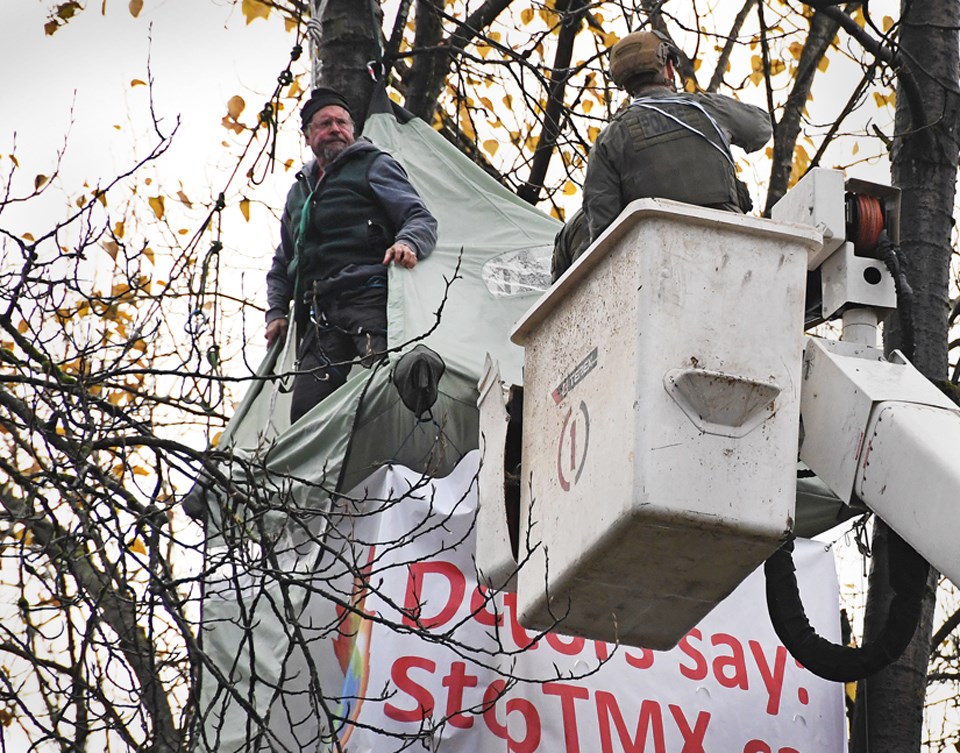A SFU professor “made his point” when he broke a court order and sat in a tree at a Burnaby Trans Mountain Pipeline worksite for three days last year – but now the court has responded.
That was how B.C. Supreme Court Justice Shelley Fitzpatrick put the case of Dr. Tim Takaro on Wednesday morning before sentencing the New Westminster resident to 30 days in jail.
TMX injunction
Takaro had pleaded guilty to criminal contempt of court in relation to events between Nov. 23 and Nov. 26, 2021.
He had occupied a tent suspended about 100 feet up in a tree inside a Trans Mountain worksite on the southern corner of Lougheed Highway and Gaglardi Way for three days before being arrested, according to agreed facts presented in court.
Crown prosecutor Ellen Leno said Takaro had broken a June 2018 B.C. Supreme Court injunction by violating a five-metre injunction zone around Trans Mountain worksites and by impeding TMX work.
She called for a 30-day jail sentence, citing the need to deter others from ignoring court orders.
But defence lawyer Neal Chantler argued Takaro should be allowed to serve his sentence in the community because he has a heart problem that could cause a heart attack if he were sent to jail.
Chantler noted Takaro had no criminal record and had never been charged with contempt before, although he had been involved in an earlier tree sit in Burnaby in September that only ended after police showed up.
Chantler also pointed to Takaro’s early guilty plea.
Chantler proposed a one-month conditional sentence order with 24-hour-a-day house arrest, followed by three months of probation with 120 hours of community work service.
Near the end of a sentencing hearing Monday, Takaro made a 15-minute statement, speaking at length about his efforts since 2014 to oppose the pipeline expansion as a physician, epidemiologist and toxicologist.
“I have the utmost respect for the court, but here in Canada we are in deep trouble, trouble that the UN secretary general calls moral trouble, because our fossil energy policies are exactly the opposite of what is required to reduce the numbers of people who will die from climate change. These environmental professional responsibilities and obligations led me to stay in the tree until Nov. 26.”
Rule of law
But Justice Fitzpatrick wasn’t convinced by the picture Takaro painted of his dilemma – or a court case he cited to support it.
During his statement, Takaro had quoted a 1994 B.C. Court of Appeal decision in the case of six people convicted of criminal contempt in relation to the Clayoquot Sound logging protests on Vancouver Island:
“A public and, as far as possible, passive act of resistance to a law that is perceived to be unjust, coupled with an embracing of the appropriate punishment for the offence, is consistent with the procedures for bringing about democratic change, and when properly understood indicates the highest respect for the rule of law as a benign and necessary part of the structure of a just and democratic society.”
Fitzpatrick, however, pointed out Takaro wasn’t exactly “embracing of the appropriate punishment for the offence” as others had done before him.
“To the contrary,” Fitzpatrick said, “Dr. Takaro now seeks a non-custodial sentence so that he may lessen the punishment of a jail term by staying in his comfortable home for 30 days with all its amenities and avoid the ordeal of jail time.”
Fitzpatrick also noted the decision Takaro had quoted was a dissenting opinion in the Clayoquot case which was not endorsed by the majority.
She quoted the majority:
“The fragility of the rule of law is such that none of us who seek to enjoy its benefits can be permitted the occasional anarchical holiday from its mandate, no matter how compelling or how persuasive may be the cause that such anarchy seeks to advance. Furthermore it is only through the rule of law that any meaningful, lasting or effective change can be wrought in the law.”
Fitzpatrick called Takaro’s offence “serious,” noting it was public, designed to cause maximum delays and happened three years after the injunction was first put in place.
She concluded jail time was the “only suitable way to express the court’s condemnation” of Takaro’s conduct and deter others who might follow his path.
His health problems were not an “overriding consideration” in the case, Fitzpatrick said, since Takaro would have access to health care in jail.
She also pointed out that his “so-called serious health issues” had had “no apparent impact” on his “ability to scale 100 feet up a tree while hauling equipment and supplies all on his own and then survive in a small tent for three days, no doubt involving some considerable exertion and stress.”
Fitzpatrick ruled a 30-day jail sentence was appropriate in Takaro’s case.
“Dr. Takaro’s counsel states that Dr. Takaro has ‘now made his point,’ but now the court has responded,” she said.



